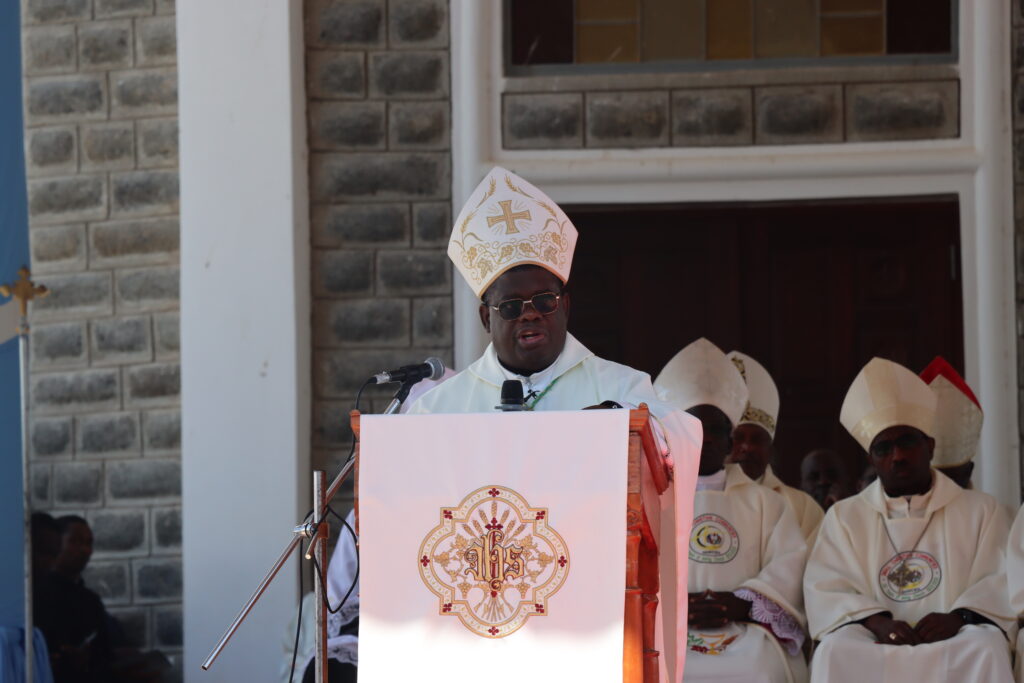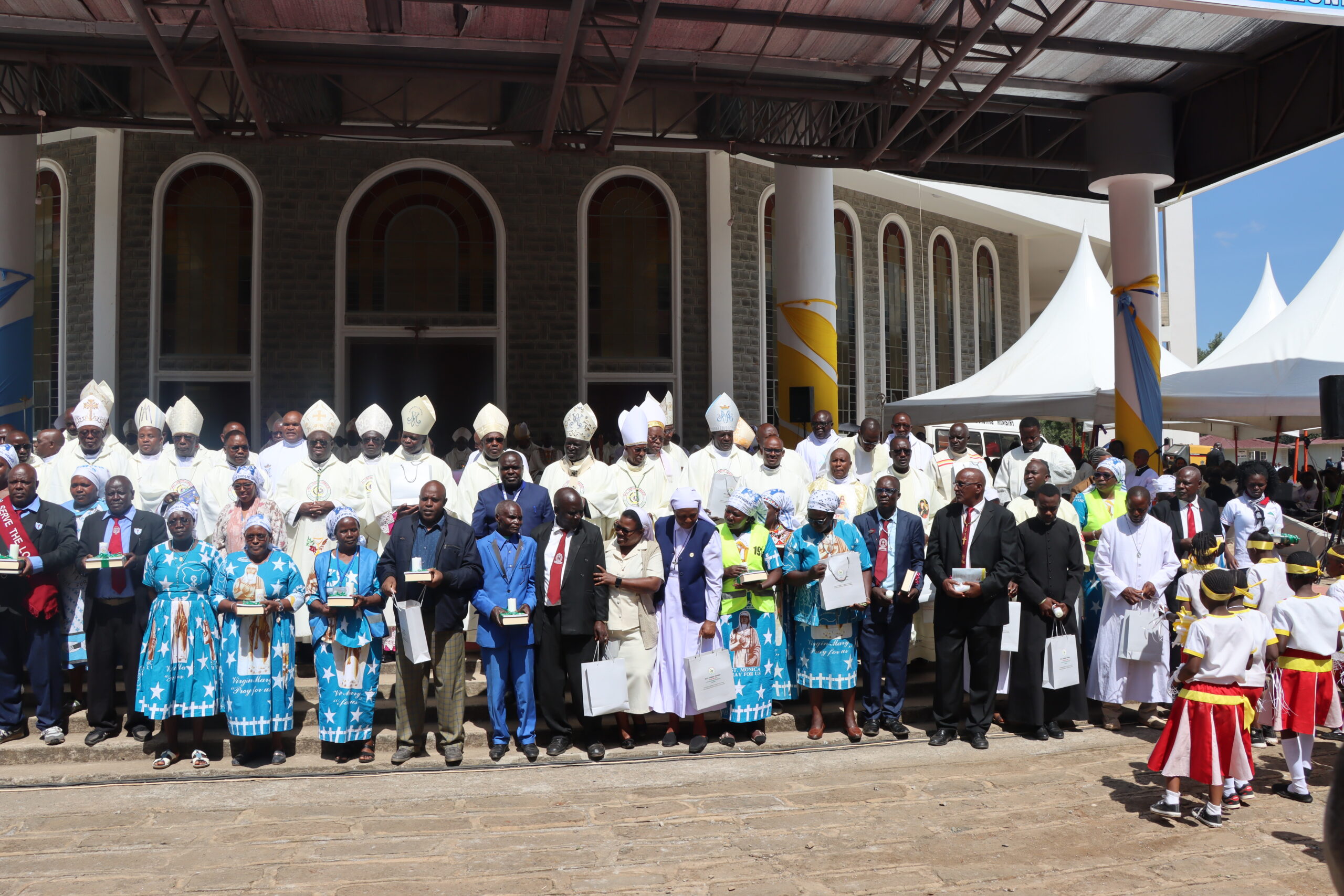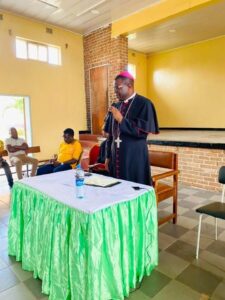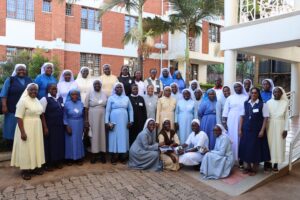AMECEA: Golden Jubilee of SCCs in AMECEA Closes With Calls To Make The Church Truly Local

AMECEA Chairman Bishop Charles Sampa Kasonde
Sr. Jecinter Antoinette Okoth, FSSA
As the Church in the Association of Member Episcopal Conferences in Eastern Africa (AMECEA) region closes the year-long Golden Jubilee celebration of Small Christian Communities (SCCs), the chairman of the Bishops’ association has urged the diocese to strengthen the SCCs to a level that they respond to the needs of the local people in the region.
While addressing thousands of Christians who gathered at the National Marian Shrine of Subukia in the Catholic Diocese of Nakuru, Kenya, Bishop Charles Sampa Kasonde of Solwezi Diocese, Zambia, expressed that as the region marks the beginning of a new journey in deepening and perfecting the SCCs as a way of being Church for the next 50 years, this ecclesial model should be an avenue “that make the Church become local.”
By responding to the needs of the local people Bishop Kasonde said referencing the Gospel of St. Mark the Evangelist, SCCs “Should strive to bring the young people to the Mountain of Transfiguration, such that they are able to meet Jesus and say, “Lord, it is good to be here, let us build three tents.”
The Zambian Prelate urged further that SCCs should be “places for promoting Integral development of the human person, addressing the cultural diversity and social needs as well as nurturing vocations and ministries, Christian and catechetical formation.”
Recalling how SCCs commenced in the AMECEA region that comprises nine countries from Eastern Africa, Bishop Kasonde noted that during the 5th Plenary Assembly of AMECEA, held in Nairobi, Kenya, in 1973 with the theme ‘Planning for the Church in Eastern Africa in the 1980s’, the “Bishops of AMECEA resolved to embark on building the church that is truly local and proposed a shift in the ecclesial model from the parish centered to “Church in the Neighborhood,” sharing the same way of life and living the Gospel values in the community.
The Bishops noted during their plenary that “While the Church of Christ is universal, it is a communion of Small Local Christian churches, communities of Christians rooted in their society and is led by the local people who meet and answer local needs and problems and finds within itself the resources for its life and mission.”
With this backdrop the bishops approved the birth of SCCs in the region saying, “We believe that in order to achieve this we have to insist on building church life and work on basic communities in both rural and urban areas. Church life must be based on the communities in which everyday life and work take place.”
According to the AMECEA chairman, as the region journey together in integrity as a family of God through SCCs for the next 50 years, the ecclesial model of SCCs should be “Places for promoting prayer life, reverence for God, sharing and celebration of life.”
He stressed on this saying, “Let them (SCCs) be small enough for the people to know each other on a personal level.” Besides, “The Small Christian Communities should be evangelizing communities that help Christians give witness to faith through service, stewardship, and social commitment. At the same time promoting prayer life, reverence for God, sharing and celebration of life.”
The year-long regional celebration of the Golden Jubilee for SCCs was officially launched last year in Dedza Diocese, Malawi and the closure at Subukia Shrine in Kenya, marks the beginning of the conclusion of the Jubilee Year celebrations that will be followed by similar events in the respective AMECEA member countries.
 As the celebration coincides with the Church’s ongoing Synod on Synodality, which can be seen as another expression of the same spirit embodied in SCCs Bishop Kasonde said, “This model has been a key pastoral priority for AMECEA, marking 50 years of their existence hence the milestone will be celebrated throughout the year at various levels, including regional, national, diocesan, parish, and within SCCs and families across the AMECEA member countries.”
As the celebration coincides with the Church’s ongoing Synod on Synodality, which can be seen as another expression of the same spirit embodied in SCCs Bishop Kasonde said, “This model has been a key pastoral priority for AMECEA, marking 50 years of their existence hence the milestone will be celebrated throughout the year at various levels, including regional, national, diocesan, parish, and within SCCs and families across the AMECEA member countries.”
In conclusion, the Zambian Prelate stressed that having SCCs as a pastoral priority in the region, the Bishops established the model “with the desire to inspire the African cultures with the message of the Gospel and build an ecclesial model that is truly local, self-reliant, self-ministering and self-propagating.”
He added, “This was in response to the Vatican Il’s View of the Church’s Mission, which is also the stance of the current Synod on Synodality which promotes journeying together as Church through Communion, Participation and Mission.”


